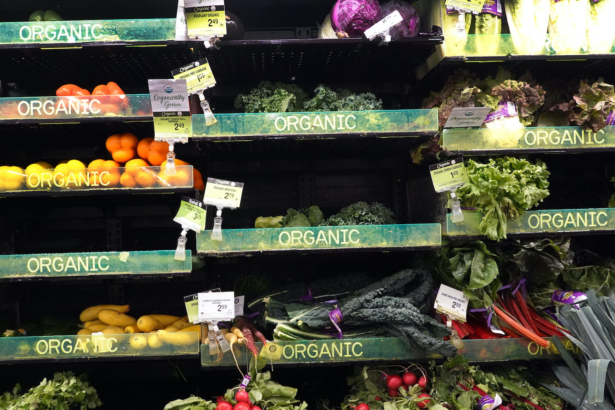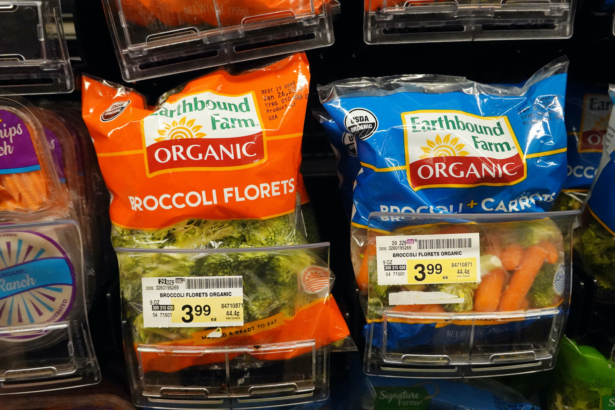The U.S. Department of Agriculture (USDA) updated its rules on Thursday in an effort to weed out fraud and boost consumer confidence in foods labeled “organic.”
“Protecting and growing the organic sector and the trusted USDA organic seal is a key part of the USDA Food Systems Transformation initiative,” USDA Under Secretary for Marketing and Regulatory Programs Jenny Lester Moffit said in a statement, calling it the “biggest update to the organic regulations since the original Act in 1990.”
“This success is another demonstration that USDA fully stands behind the organic brand,” she said.
The new update, called the Strengthening Organic Enforcement (SOE) final rule, aims to better protect organic integrity and bolster both farmer and consumer confidence in the USDA organic seal “by supporting strong organic control systems, improving farm to market traceability, increasing import oversight authority, and providing robust enforcement of the organic regulations.”
These amendments, the USDA’s National Organic Program (NOP) explained, will “close gaps in the current regulations to build consistent certification practices and deter and detect … fraud and improve transparency and product traceability.”
The new rules go into effect on March 20. Affected companies will have one year to comply with the changes.
Growth in Organic Market
The USDA already had a strict definition of “certified organic,” requiring farmers to meet specific standards regarding “soil quality, animal raising practices, pest and weed control, and use of additives” before they can apply the label to their products.
The NOP explained one factor inspiring the sudden impetus for the changes—recent organic market growth.

Sales of organic products in the United States reached more than $63 billion in 2021, according to the latest Organic Trade Association (OTA) numbers. Organic food now makes up 90 percent (or $57 billion) of all organic sales, an approximate two percent growth over the previous year, despite it following 2020 with its pandemic-induced “pantry loading” and “supply chain shortages.”
The “complex” supply chain is another factor that contributed to the need for the rule’s changes. “The organic market is characterized by long – and often global – supply chains where organic products are handled by many businesses before reaching the consumer,” the NOP statement said.
Alliance for Natural Health, a grassroots advocacy organization, explains the predicament. Often these businesses or “middlemen” within the supply chain, such as brokers and handlers, are not certified organic, and, therefore, the USDA has no oversight or enforcement authority over them. This situation has led to several instances of fraud, totaling millions of dollars.
For example, the alliance pointed out organic grain is often stored in grain elevators, which aren’t required to be certified organic. Because of this, the NOP can’t require “organic certifiers” to investigate onsite use of these grain elevators. Investigations, when done, have found that “criminals” are using this loophole “to funnel nonorganic feedstuffs through uncertified grain elevators.”
Additionally, current regulations only require organic import certificates from the European Union, Switzerland, Japan, and South Korea, the alliance said. Any goods imported from other countries with standards different than the United States, such as Australia, technically can’t be labeled as certified organic. The updated rules will now require organic import certifications from all countries.
In short, every step along the organic supply chain—from seed to final sale—must be verified to earn the USDA Organic Seal.

The OTA, an advocacy group that played a critical role in the campaign to strengthen organic regulation, celebrated the news in a statement, calling the updated rules “a major accomplishment” with its “far-reaching impacts on the organic sector,” adding “the new regulation represents the biggest change to organic regulations since the creation of USDA’s National Organic Program.”
The National Organic Coalition (NOC), an organization that “advocated forcefully for the finalization of the rule” also applauded the USDA for its efforts. In a statement released on Jan. 18, NOC described the rule’s rewrite of organic regulations as “massive” and a “significant” step toward tackling fraud in the organic supply chains.
Organic Industry Fraud
The updated regulation comes on the heels of recent indictments for fraud involving organic food.
Last week, the U.S. Attorney’s Office of Minnesota charged two men who conspired together to sell more than $46 million worth of non-organic grain—corn and soybeans—that they falsely labeled as organic.
Earlier this month, two men from Dubai and several from Turkey were charged for their conspiratorial involvement in a multimillion-dollar scheme to purchase non-organic soybeans and corn from Eastern Europe before shipping it to the United States as organic, allowing them to sell the fraudulently-labeled grain at a 50 percent markup.
And in 2019, what the Justice Department called “the largest organic fraud case in U.S. history,” a Missouri man was sentenced to ten years in federal prison for selling at least $142.4 million worth of non-organic grain as though it was organic. He committed suicide just weeks before he was to start serving out his sentence, AP News reported.
